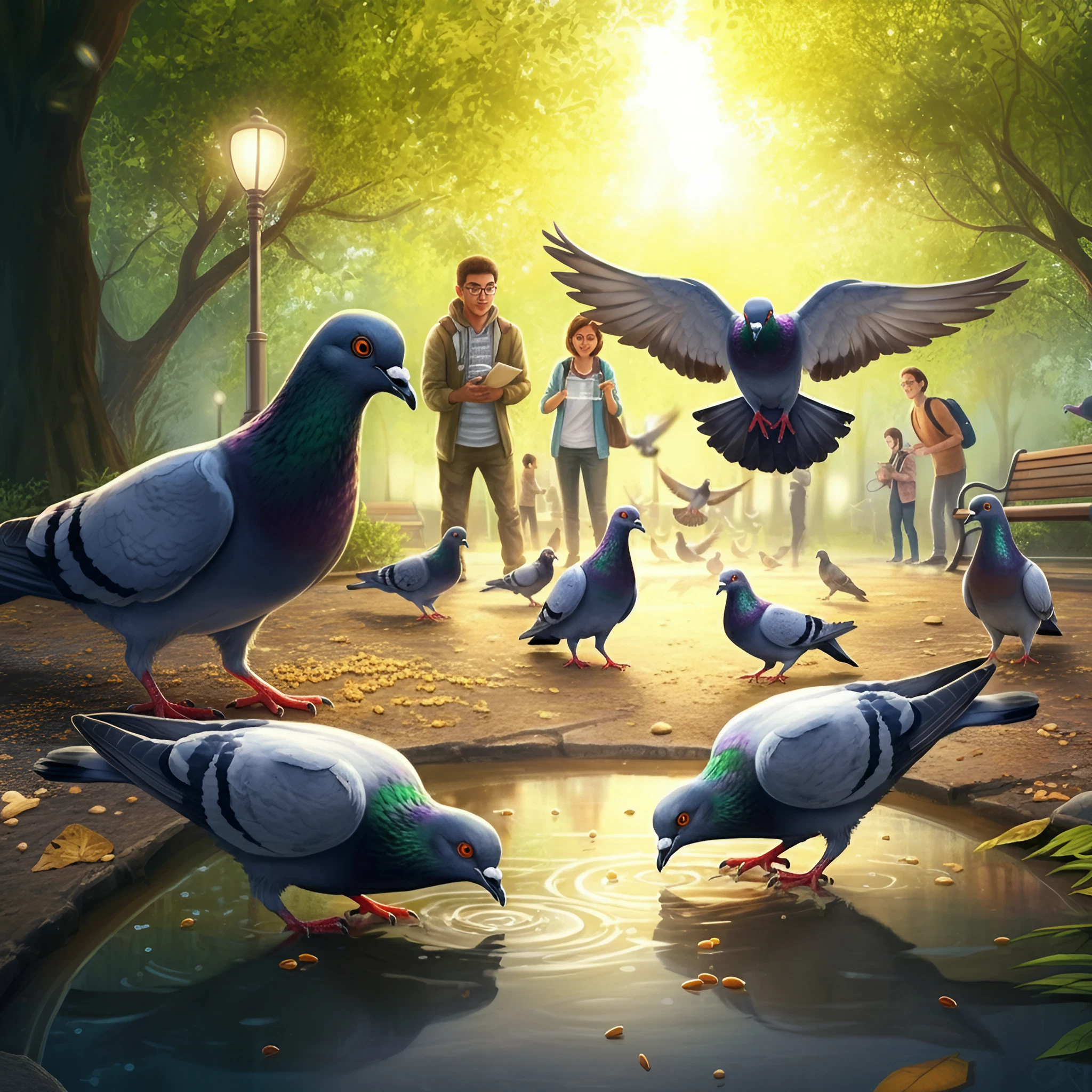Pigeons are more than just a common sight in cities and parks; they are fascinating creatures with unique dietary habits. As a species, pigeons have adapted to survive in various environments, from urban landscapes to rural settings. Whether you’re a student working on a research project, a tech enthusiast exploring algorithms inspired by bird behavior, or simply curious about these birds, understanding their diet is key to appreciating their biology and behaviors.
This guide will cover the basics of what pigeons like to eat, their drinking habits, foods they dislike, and whether bird seed is part of their diet.
What Do Pigeons Like to Eat?
Pigeons are omnivores, which means they can consume a variety of foods, including both plant-based and animal-based items. However, they primarily prefer grains and seeds, making these their diet staples. Here’s a breakdown of their favorite foods:
Grains and Seeds
- Wheat, corn, and millet are among the grains pigeons are most fond of. These grains are easy for them to digest and provide the carbohydrates they need for energy.
- Sunflower seeds and safflower seeds are also common favorites, especially for pigeons raised domestically.
Fruits and Vegetables
While grains and seeds are their primary food source, pigeons enjoy small fruits and vegetables, such as:
- Chopped apples
- Diced lettuce or spinach
- Peas and small chunks of carrots
Pecking at Human Food
Urban pigeons are often seen scavenging for scraps of human food. They’ll eat anything from breadcrumbs to pizza crusts. However, just because they eat these items doesn’t mean they’re healthy for them—more on this later.
Foraging in the Wild
Pigeons in rural or wild environments may forage for insects, worms, and small berries to supplement their diet. These sources provide additional protein and nutrients that aren’t always found in their urban counterparts’ diets.
Nutritional Needs
Pigeons, like all living creatures, have specific dietary requirements. Their diet should include:
- Carbohydrates: Found in grains like wheat and corn, these are essential for energy.
- Protein: Key for growth and repair, provided through seeds and occasional insects.
- Vitamins and Minerals: Found in fruits, vegetables, and occasionally through grit they consume to aid digestion.
Do Pigeons Eat Bird Seed?
Yes, they do! Bird seeds are a fantastic option for both wild and domestic pigeons. Many commercial bird seed mixes are tailored to pigeons’ preferences, including millet, sunflower seeds, and cracked corn. Providing bird seed during feeding can supplement what they might not gather in the wild.
Tip: If you’re feeding pigeons, make sure the seeds are fresh. Moldy seeds can be harmful and cause illness.
What Do Pigeons Hate the Most?
Pigeons, while typically not picky eaters, actively avoid specific textures and tastes. If you’re trying to keep pigeons away from a particular area or simply curious about their dislikes, here’s what to note:
Foods They Dislike
- Spicy Foods: Capsaicin, the active compound in chili peppers, acts as a natural pigeon deterrent. Humans might enjoy spicy snacks, but pigeons will steer clear.
- Certain Herbs and Seasonings: Strong aromatic herbs like garlic and onion have scents that pigeons dislike.
- Dirty or Moldy Food: Pigeons are more discerning than they might appear; they’ll avoid food that smells spoiled or is visibly decayed.
Physical Deterrents
- Reflective Surfaces: Beyond diet, pigeons dislike environments with shiny, reflective objects such as aluminum foil or reflective tape.
- Spiky Textures: Certain surfaces, like spiky mats or deterrent spikes, discourage pigeons from landing or feeding nearby.
Note for Researchers: These aversions are often used in urban deterrent systems designed to reduce pigeon presence in public spaces without harming them.
Do Pigeons Drink Water?
Yes, pigeons drink water—and like all living creatures, they rely on it for survival. What’s unique about pigeons is how they consume it. Unlike most birds, pigeons can drink water in one continuous swallow without needing to tilt their heads back.
Water Sources
- Natural Bodies of Water: Rivers, lakes, and ponds are common sources of freshwater for wild pigeons.
- Urban Alternatives: Urban pigeons often rely on water puddles, fountains, or birdbaths.
Hydration Needs
- Pigeons need fresh, clean water daily to support digestion and health.
- Since their diets are high in grains and seeds, which are dry by nature, water is essential to keep their bodies functioning properly.
For domestic pigeons, always ensure they have access to clean drinking water to prevent dehydration or illness.
Can You Feed Pigeons Human Food?
While pigeons adapt to urban environments by snacking on human food scraps, not all human food is safe or nutritionally adequate for them. Here’s a quick overview:
Safe Human Foods
- Whole grains like cooked rice or barley
- Small, soft fruits that are free from pesticides
- Unsalted, unseasoned popcorn or oats
Foods to Avoid
- Bread: While pigeons will eagerly eat bread, it offers almost no nutritional value. Overfeeding bread can even cause malnourishment.
- Salty or Sugary Foods: Avoid feeding pigeons salty snacks like chips, as well as sugary treats like candy or sugary cereal, as these harm their health.
- Chocolate: Highly toxic to birds, even in small amounts, chocolate should never be fed to pigeons.
If you want to feed pigeons responsibly, it’s best to stick to grains, seeds, and fresh produce.
Why Understanding Pigeon Diets Matters
Understanding pigeons’ diets goes beyond feeding them the right type of seeds or grains. It’s also tied to their overall health, urban ecology, and broader conservation efforts. Whether you’re a student researching animal behaviors, a tech enthusiast drawing parallels between pigeon foraging patterns and algorithms, or simply someone observing nature, pigeons offer incredible insights into adaptability and survival.
Being mindful of what pigeons eat not only helps maintain their health but also keeps both urban and rural ecosystems balanced.


